What does it mean to play? Maybe you imagine children playing, drawing pictures in chalk on the sidewalk in front of the house. Or maybe a few players sitting around a poker table. The latter only serves to pass the time... to make one’s free time as enjoyable as possible. Or maybe there’s more to it than that? Obviously we wouldn’t be asking if there wasn’t. No matter whether it’s children playing or adults – there’s far more going on than meets the eye.
What Is Play Anyway?
The defining aspect of play is that there’s no purpose behind it and nothing specific is meant to be achieved by it. During play, you’re experimenting within a defined space, you’re experiencing something, you’re trying out different things. And you aren’t taking yourself too seriously in the process. Philosopher Christoph Quarch defines four criteria for play:
1. Play is always something shared, an interaction. This connection with others is very important for us humans. Even when a child plays alone, they have a counterpart – in this case, the doll or the blocks.
2. People are only truly free during play. This is because play always has an undetermined outcome, whether in its original form, ritual theater, children’s role-playing, or in a competition. Even during the creative process, which is a playful act of experimentation, the end result isn’t clear to the artist beforehand. They simply allow the process to unfold.

And this is where the third criterion comes into play: experimenting with new possibilities, which can be described as creativity. Only those who can let go and try out different things are able to produce something creative.
4. Play always teaches us something. In ritual theater, the participants come away from the performance having learned something new. When you play the board game Trouble, you can see how other players react when something aggravating happens – or how well you can deal with this kind of frustration yourself.
We often think that only children play or have the right to play. And it’s true that preschool-age children should play at least eight hours a day. But adults also have a desire to play, and it would do us good to pursue this desire as often as possible.

Play as a Child
But first let’s talk about children – they’re veritable experts at play and we can learn a lot from them. They play because of an innate drive to do so, not because someone forces them to play. In fact, if you tell a child to climb a tree, it’s no longer a game.
Depending on their age, children play differently. André Frank Zimpel, a professor at the University of Hamburg who specializes in learning and development, distinguishes between six stages of play that build on each other:
Object and Subject Play
During object play, a baby becomes familiar with its environment; it touches everything and puts it in its mouth. The second stage, subject play, is also called as-if play. This is where things from the toddler’s immediate environment take on a completely different shape in their imagination – a thermos becomes an indomitable tower, a bucket filled with water a lake. At this stage, even children who are in the same room often do not play with each other at all, but rather play around each other. This is a normal part of this stage of play, however, and shouldn’t cause us any concern.
Hand Play
Even playing with your own hands can be a lot of fun – rubbing your hands together stimulates the brain’s production of serotonin, which boosts your mood. That’s why hand-clapping games are so good for kids.
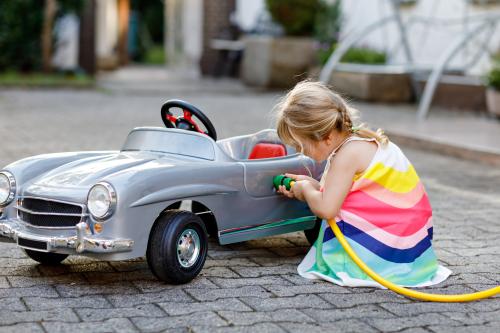
Role Play
Another key stage that children don’t enter until they’re older is the one in which role-playing games become prominent. It begins at about the age of four. This is where children begin forming an idea of themselves; previously, their own identity was a blind spot and they couldn’t wrap their head around how others perceive them. Role play represents a complex interaction where the participants discuss a topic, take on certain roles, and have to adjust their behavior accordingly. A script develops. Role-playing games offer the opportunity to try out different strategies when interacting socially. Children can ask themselves questions like: do I want to play the part of the bad guy or would I rather be the good guy? How will my playmate react if I behave this way and not that way? This type of play also gives children the opportunity to actively process experiences from their everyday lives.
Can Apes Ape?
The essence of play is imitation; children like nothing better than mimicking someone or something. Humans are the only mammals that are good at this. Apes, for example, are not good at aping at all. Many misunderstandings between parents and children occur as a result of imitation. It’s often the case, for example, that children can’t put down their smartphones because they’ve watched us using them so frequently.
Rules-Based Play
Children enjoy playing games with rules, which are the most complex form of play, from about the time they start school. This includes all games with a defined set of rules, including strategy games such as “Monopoly”. This also includes Chinese jump rope, since it’s also based on rules. In both games, players don’t need to take on a role. But reading and writing are also essentially rules-based games, as is math. The appeal of this type of game is that it’s fun to play by the rules.
Competitive Play
Competitive play, which doesn’t become interesting until school age, is about assessing one’s own abilities. During this kind of play, children are usually trying to answer the question, “what am I particularly good at?” This is where they measure themselves against classmates and other playmates.
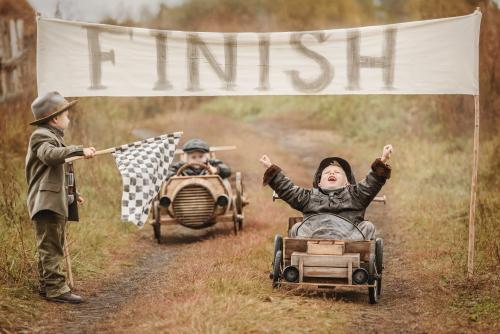
Serious Play
Serious play serves as preparation for adult life. During serious play, young people try to gauge how serious adults really are about their rules, sometimes even committing crimes to test this out.
In all these different types of play, children learn what’s possible, but also what works less well. Within the rules of the game, they can feel free to try things out and have the opportunity to develop their potential. They can perfect their skills and abilities and develop in a playful way.
Why Is Play So Important?
Through play, children not only develop physical and mental skills. Since they often play with others in the process, each encounter is also an opportunity for them to develop their social skills. On the one hand, they learn to get along with each other and deal with defeats, but on the other hand, they also learn not to brag when they’ve won (and the other person has lost). Studies have shown that children who play with others frequently are much more likely to share than those who do so infrequently.
Archive of Social Values
For Theo Poppe, a psychologist at the University of Leipzig, games serve as an archive of social values. The game “Trouble”, for example, encourages players to be good losers. But André Frank Zimpel, head of the Center for Neurodiversity Research in Hamburg, doesn’t think that’s necessary. Numerous studies have shown that children do not need to be raised to be moral; they are innately moral beings, incredibly eager to help, and are sympathetic to those weaker than themselves.
Playing enhances our enjoyment of life, as each obstacle we overcome activates our reward center. In this process, the following mechanism takes place: our brain finds itself in state of incoherence, where we don’t understand, don’t know, or aren’t yet able to understand something. We cannot yet place our perception. Once we engage with it, we begin to understand and find solutions. Irritation gives way to a feeling of happiness – neurotransmitters that have a similar effect to drugs are released, and a feeling of joy or enthusiasm flows through us. With kids, this happens a lot, which is why they have so much fun learning so much in a short amount of time.
It is scientifically proven that we lose fears when we play together; pressure and compulsion dissolve into thin air. We feel free – and at the same time, our fear disappears. Dr. Zimpel believes that mass murderers, for example, did not have enough opportunity to play and roughhouse and therefore developed very rigid thought patterns – which, ultimately, can lead to such acts.

Over the course of our lives, it appears that the ability to control one’s impulses is absolutely critical. You probably know the experiment where kids were given candy, along with two options – either eat one piece right away or wait and get a second piece after waiting a certain amount of time. How children did in this experiment was a good indicator of how successful and happy they would be later in life. Those who could wait led more satisfying lives in adulthood. When children control the impulse to pop the candy in their mouths, they learn that effort is worthwhile.
Children’s games are generally designed to control impulses. Such as by having the little ones imagine that an evil wizard has poisoned the candy and that’s why they aren’t allowed to taste it, for example. During role play, in turn, they learn to use their facial expressions and gestures in such a way that it isn’t possible to tell how they’re actually feeling. This, as we all know, can also be beneficial in adult life.
Bye-Bye, Grasp Reflex
If you’ve wondered why your toddler keeps throwing things out of the stroller, good news – the child isn’t doing it to annoy you, but is practicing impulse control. It has overcome the grasp reflex and repeatedly derives happiness from the realization that it can also let go of things.
Unlike spiders, who hatch and immediately know how to spin a web, infants and young children must first learn to navigate their new world. Their brains have an overabundance of synaptic contacts – far more than adults. All of these contacts represent opportunities and potential. That’s why it’s important for children to be able to experiment through play. This is how they develop all by themselves, unintentionally and unconsciously. In this way, the connections in their brain strengthen. Everything that isn’t needed is later eliminated. Dr. Zimpel sums up this insight in a beautiful image: we come into the world as cosmopolites and turn into country bumpkins. That’s why you should give your child the opportunity to discover and create – to play – as often as possible.
What about Early Education?
Every child’s brain already has the connections in place that would allow them to easily learn Quechua, Kiswahili, or Mandarin. Or all three languages at once. If they don’t learn these languages as a child, their ability to so fades away and as an adult, they will usually have immense problems with the idiosyncrasies of a foreign language – such as telling the pitches in Chinese apart or even reproducing them. When it comes to this potential, it’s truly a case of use it or lose it. And that’s exactly what scares many parents – that their children won’t make full use of what’s inside them, that they’ll squander their potential. That’s why they organize guitar lessons for the little ones, sign them up for rhythmic gymnastics, and send them to a bilingual kindergarten. Dr. Zimpel’s theory, however, is that early educational programs are either too challenging or not challenging enough for children. Instead, his advice is for people to either play with their children or let them play; then they’ll become smart on their own.

Our offspring only develop when they have the opportunity to play, not when someone has already figured something out and is just conveying knowledge. After all, learning to walk, a highly complex process, doesn’t require a school either. In this case, the little munchkins also playfully explore how best to do it (but not without setbacks every now and then) – until they just can. This principle can also be applied to other things. During play, children discover abilities hidden inside them simply in passing. One child, for example, might discover the ability to be supportive when friends confide in them about their worries and fears, making this child particularly socially adept. Another child, in contrast, may discover that he or she is able to build a particularly tall tower out of blocks. Gerald Hüther refers to this as “achieving a feat.” And also of a “highly gifted climber” – when a child excels at climbing. In his opinion, there are many different kinds of talents, not only in the realm of the musical or the intellectual.
I Know What You Want Me to Do
Parents are often want nothing more than for their children to be intelligent – mathematically intelligent. Yet Dr. Zimpel believes that social intelligence (which is learned in role-playing games, among other situations) is much more important. After all, everyone instinctively knows what the next number in the series 2, 4, 6 is. But not a supposedly clever computer, because it can also find rules that say the next number could be 342. Or -19. PCs are not socially intelligent. But we are, which is why we can guess what’s expected of us – namely, that we come up with the obvious solution: 8.
Fear and Joy
This is why Dr. Zimpel does not recommend early education, because he knows that playing is the most sustainable and efficient form of learning. This is due to the fact that you remember things you learn while having fun. Positive emotions play a major role in this context. They ensure that we remember what we’ve learned. Neurotransmitters in our brain that are released when we experience emotions are responsible for this. They ensure that we enjoying thinking back to a learning situation and therefore voluntarily repeat it. That’s why Dr. Zimpel named one of his books “Spielen macht schlau!” (“Playing Makes You Smart!”).
But negative emotions can also be responsible for something sticking in our memory. In fact, people actually learn best when they are scared. This has been demonstrated, among other examples, by people who have gone through traumatic experiences – often a single sound, smell, or image is enough to trigger the original trauma (i.e., what they once learned in a very short period of time). But even though fear works so well, it’s much wiser to learn through play and while having fun.
School Keeps Kids from Realizing Their Full Potential
Dr. Zimpel, an expert in learning, put forth an interesting observation: children do not need to learn as much as possible in order to develop. In fact, it’s the other way around – they need to develop cognitively so they don’t have to learn so much. And play is the perfect solution for them in this regard, because during play, they don’t distinguish between learning and playing at all.
Nowadays, a growing number of educators are calling for learning to have as little structure as possible (for more on this, see our blog post “Learning Has to Become Awesome”). The reasoning behind this is that by focusing solely on grades, children have little opportunity to pursue their passions and discover what talents lie within them. Without outside guidance, they face those challenges that they can handle well – those that are neither too challenging nor not challenging enough for them. They themselves are the best judge of what that is at any given time. During play they develop imagination, and this is more than just crazy ideas! In order to visualize atoms, bacteria, or other complex conditions, you need a lot of imagination, even in later years.
No Adults Allowed
Many parents ask themselves whether they should participate in their children’s play. Or whether it would be good for them to encourage their children to play. This isn’t necessary; children play all by themselves. We adults can, when appropriate, offer ideas or suggest a game from the next stage of development – but a child will only really enjoy playing it when he or she is ready.
We ourselves shouldn’t get involved when children are playing, because adults are nowhere near as enthusiastic as children. Kids quickly realize when we’re just pretending to be into it. And the one thing we should never do is praise or reprimand them during play. Both can quickly put an end to the fun. This is because children then no longer just go for it, but instead allow themselves to be guided by our ideas, our expectations, and our parenting goals. Even praise is harmful – many experiments have shown that external motivation destroys intrinsic motivation. Playing as a child is, in fact, its own reward.

This has also been the experience of Arno Stern, who’s been running the Painting Place in Paris for decades. The Painting Place is a secluded space where children can focus on themselves and where they can paint what comes from within themselves. It isn’t a place for them to be taught how to be better painters, because what they create aren’t works of art – they aren’t painting to please a viewer, nor do their creations have a message, as art usually does. Instead, painting here is nothing more than play.
Stern is, of course, interested in what “his” children paint and assists them, but he hardly ever asks questions – because questions lead to the little painters having to justify themselves. They are forced into a defensive position and feel inferior. Every instruction, every judgment of what they paint can lead to the source of spontaneity in the child drying up. This is also why everything painted at the Painting Place remains there and is never seen by the outside world. Taking the children seriously in what they’re doing is quite enough, says Stern.
Playdates – The Latest Trend?
The days when little Alexander would ring the doorbell because he wanted to know if his friend Dan could come out to play are long over. Anyone who lives in a residential development will know that the playgrounds in the area tend to be deserted. Worried about everything that could happen, parents no longer let their children run free, and instead prefer to keep an eye on them.
Parents are not only filling the little ones’ calendars with educational and extracurricular activities, but are also increasingly scheduling their free time activities as well. This trend is most visible here in the US, where parents set up playdates with other parents to get their children together to play. In a way, it’s kind of like dating for adults, because it’s often not clear whether the parents are compatible with each other. Awkward conversations can be the result – and slim chances of a future playdate. If the parents aren’t a good fit, the children won’t play together for long either. Or the parents bite the bullet and spend time with someone they don’t really like. This structured approach to free time means that children are no longer as spontaneous and curious as they used to be.
Types of Games
Before we turn to adult play, let’s take a look at the types of games that exist today. In their book, “Rettet das Spiel! Weil Leben mehr als Funktionieren ist” (“Save the Games! Life Is More than Just Functioning”), Christoph Quarch and Gerald Hüther distinguish between five types of games: games of skill, competitive games, ritual theater, plays, and games of chance.
Games of Skill
Skill games are often simply a way to pass the time while having fun. In the process, we tap our cognitive or motor potential – whether we’re climbing a wall while bouldering, juggling balls, solving a logic game, or guiding a hero through different worlds on the computer. We only see a limited amount of development during these games, because we are always carrying out the same movements or thought processes.
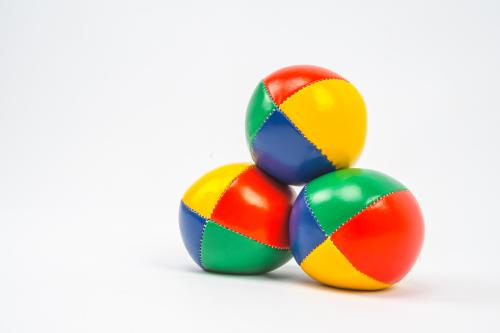
Competitive Games
Competitive games don’t have a good reputation with educators because in the end, there’s always a winner. And that means also always a loser. The competition is the main focus of this type of game. This category includes all of the types of sports seen at the Olympics, for example – because purely competitive games are mostly found in the world of sports – but also most board games. But even though educators would rather not see their students in competitive situations, kids think competitive games are great – and want to win so, so badly. Hüther and Quarch do not take any issue with this. From their point of view, strong emotions experienced while winning or losing are probably better than dull, detached interactions. Despite their competitive nature, competitive games are still just games – you play simply for the fun of playing. On the other hand, all kinds of games can be turned into competitive games. For example a singing contest, where the main focus is on the participants’ voices, but in the end the they compete against each other – and fame and glory await the winner. Or like on “America’s Got Talent”, where contestants demonstrate their unusual talents (a game of skill) while competing against others. Or also a poker tournament, which is actually a game of chance – but if it is held in the form of a tournament, the aim is once again to win.
Ritual Theater/Plays
Ritual theater was one of the most original forms of games. As with other games, the boundaries with respect to time and space are predefined. The shaman marks the playing field and begins the “game” on a stage that resembles a temple – in this game, there’s no winner and nothing needs to be accomplished, but in the end, something will be revealed. What, however, is still uncertain at the very beginning. Plays are related to ritual theater. In a play – similar to a ballet performance or a feature film – the aim is to portray the human condition. Plays feature interaction between the individual performers, between the performers and the audience, or between the performers and the rules of the game.
Games of Chance
Games of chance have their origin in the oracle of classical antiquity. The oracle’s prophesy was always determined by chance. And therein lay its appeal. Nowadays, a trip to the casino is also about finding out whether you have lady luck on your side or not. The fact that you are in a game that has nothing to do with reality becomes clear, among other reasons, when you look at the evening attire people wear – it can be seen as a kind of disguise for the game. When playing roulette or blackjack, the player must not care about the final outcome. Anyone who goes to a casino to win is no longer a player. The game has ceased to be a game – instead, it’s all about winning. That is why slot machines aren’t real games. The same is true for sports betting – it’s no longer the game itself that counts, the skill of the athletes, but only the final score and thus the win.
Games Adults Play
Do adults also play? There’s no easy answer to this question. Some play more, others less. Everyone certainly has moments when they play. For example, when playing through all the possibilities before making a decision. People in certain professions are veritable players – some play with colors and paint works of art, others with words and give birth to novels and poems, others on musical instruments, and still others play with wood or clay, which they turn into sculptures.
But the vast majority of our society is dominated by economic thinking. The question in this case is always the same: “What’s in it for me?” The values of economics include effectiveness, functionality, productivity and profitability; in fact, originally they were only found in economics. Increasingly, however, they are penetrating other areas of life, such as health care, culture, and even religion. Even at daycare centers, the workers aren’t judged by how much good they are doing for the children’s development and how much is changing in the children’s minds, but whether they work economically and efficiently. Our lives have become serious – serious at work, serious in business and industry, serious in politics. There’s little room for fun and games. Most people try to make the best of themselves, to get as far up the ladder as possible, to earn a lot of money. This is seen as more important than our own development – where we, on the other hand, explore and investigate our possibilities.

But many people suffer from this lack of levity, from constantly having to check tasks off their to-do list. As a result, psychosomatic illnesses are on the rise, many suffer from burnout, and some are simply unhappy and don’t really know why. What’s happened is that they’ve gone from being active players in the game of life to being mere consumers. In the past, for example, people really experienced the full range of emotions with the actors during a play at the theater, while nowadays they just consume what’s happening on a screen. People simply watch what’s being served up while simultaneously reaching into a bag of chips. Play, whatever its nature, is turning into mere entertainment. Even people who spend hours and hours in casinos or excessively play online games are looking for something there that they can’t find in real life. Whether this path will lead to success is questionable.
Soccer: The Game of Games
How much of soccer is really a game? Quite a lot, actually. It’s a mixture of a play, a game of chance, a game of skill, and a competitive game. The elements that are typical of all games can also be found in soccer – there are clear rules and the game has spatial boundaries and a defined start and finish. The players wear uniforms, clothing designed for a single purpose: to play in. The spectators at the stadium, who can also be identified by their special game attire, are directly involved in the action and follow along. Soccer is one of the few games in the world that really connects a lot of people – the final match of the 2014 World Cup was watched simultaneously by 1.2 billion people around the world. And yet the game is thoroughly shaped by economic aspects. This isn’t only evident from the advertising banners plastering the stadiums and the logos on the players’ jerseys. The sport is plagued time and again by cases of corruption, betting scandals, and other illegal schemes. Philip Lahm, former captain of the German national team, captured the essence of the game when he once said, “if I think about the bonus we get for winning during the game, I can’t play anymore.”
Our first experiences that move us in the direction of economism and ultimately transform us into “Homo economicus” occur during our childhood. During our early years, we are at the mercy of our parents’ desires, expectations, assessments, and parenting practices, and we feel like objects. Later, we try to escape this role by objectifying others in turn – whether as politicians, entrepreneurs, marketing professionals, or some other profession. But this doesn’t work out for everyone, and those who don’t succeed (because they haven’t achieved a high enough position professionally) feel frustrated, are dissatisfied with their lives, fall into passivity, feel like victims of their circumstances, and finally resign themselves to their fate.
These people don’t feel like they live self-determined lives. They don’t feel like they are special and so they take refuge in consumerism – buying shoes, expensive cars, a new smartphone, or going on trips. And the more of these people there are, the better the economy flourishes, producing shoes, cars, and smartphones, and offering every conceivable form of entertainment to frustrated and bored citizens.

Unfortunately, this economism is also increasingly taking hold of our children – and we are partly contributing to it. For example, if we interfere with their play and confront them with our expectations and teachings or impose requirements, the children stop playing. Now they wait for us to tell them exactly what to do – and how to do it. From this point on, they’ll no longer be active and creative on their own, but will fall into an attitude of expectation. But when there’s no one to tell them what to do, they’ll get bored. The children don’t know what to do with themselves and turn into consumers. This plays right into the hands of the manufacturers of products designed to “cure boredom” – they come up with ever dumber forms of entertainment for the little ones, which parents buy, buy, and buy again to keep their children occupied. And these mountains of toys, when they’re no longer interesting, just make them even more bored. And this boredom is becoming increasingly visible even in our surroundings, where there are only concrete surfaces with a piece of playground equipment here and there instead of (overgrown) parks, rubble heaps, and adventure playgrounds – because many children are simply no longer capable of playing.
Addictive? Affirmative!
Time and again, people warn of the dangers of online games – is there any truth to this? Unfortunately, yes. Many online games lack an important element that all other games have in common: time limits. The game is never over, it always keeps going, new challenges are always awaiting the gamer. The dangerous thing is that players often have trouble tearing themselves away from the game and end of spending large amounts of their free time in a parallel world. Game manufacturers often promote their games by saying that they’re addictive – and this shouldn’t be underestimated. Children and teenagers can actually become addicted to the games and then need help.
Couch Potatoes
Where does the consumerism that we’re now learning as children lead? It is slowly becoming apparent that many careers which exist today will soon be taken over by algorithms. A wide range of industries will be affected, including the electrical, metal, mechanical, secretarial, financial, transportation, logistics and shipping, chemical, textile, and food and beverage sectors. It’ll affect telephone operators, accountants, warehouse workers, tailors, pastry chefs, and many others. What will remain are occupational fields in which creativity or, for example, the ability to empathize, will play a major role. All other occupations that involve simple and repetitive activities (i.e., activities that are not fun at all) will be eliminated. The people that have pursued such professions up to that point will no longer have any external incentive to leave the house and will remain sitting on the sofa. These people would, says Hüther, taking his theory even further, receive a universal basic income and hang out bored at home. To combat the boredom, they then immerse themselves in virtual worlds. The expensive VR headsets they need are financed by the gaming industry. People keep to themselves in this brave new world, and family and children are left neglected. The only people who won’t be affected are people who like to work – because their lives are about creating and discovering, and they can keep themselves busy.
Fun at Work
A playful approach is not only important as a way to have fun at work. It also produces better results. Approaching a question in a playful way means not thinking about the obvious, but letting your mind wander first – not while under pressure and preferably not at a desk. The best ideas come to us when we aren’t pursuing any particular goal – when we simply let our thoughts wander and they come together on their own to form a whole.

People don’t come up with groundbreaking innovations when expected to deliver a result by a certain deadline. And such innovations also don’t build on something that already exists. The discovery of the internal combustion engine, for example, which could be used to power a vehicle, was one such creative achievement – what followed were further developments and specific applications: mobile homes, convertibles, off-road vehicles. Linear innovations of this kind can certainly be generated through competitive pressure, but the same cannot be said for truly creative achievements. For that, you need breathing room. Even the development of rockets, the journey to the moon, and outstanding works of art were not planned in this way, but came about more or less by chance and trial and error.
In any case, we have the best ideas when we play together with others. This is when co-creativity occurs – one thought builds on another; the flashes of insight fuel each other. The end result is something that we certainly wouldn’t have achieved on our own. Not just the sum of individual ideas, but something that goes beyond them. The other person is a player, not a competitor.
Hüther heads the Academy for Potential Development in Göttingen, and tells of a case in which co-creativity led to a major achievement. He once worked with a team of amateur cyclists from Germany who wanted to compete in the Race Across America, one of the toughest bike races in the world. The team members didn’t make any progress in training and were at each other’s throats during easy rides – a race from the East to the West Coast of the United States was certainly not going to turn out well. Hüther taught them how to work together, to playfully test the limits of what was possible, to listen, encourage, and inspire each other. The result was that the team not only managed to make it across the finish line, but actually took first place. And did so without any sponsors at all – like the American athletes had, for example.
But it isn’t only when aspiring to exceptional performance that play helps us get ahead. In fact, you can view all of life as a game. That would be the art of living in its purest form – as opposed to the technique of living. Whereby this work of art of one’s own life is never finished. It always continues, new players come along who show us new viewpoints, new creative spaces open up for us in which we can unleash our potential. When contending with ever-changing teammates and opponents, we shouldn’t simply rely on the skills and techniques we’ve previously learned, but instead always try out new moves. Doing so keeps us energized, helps us explore our possibilities, tap into the potential that lies dormant within us, makes us feel connected to others – and rejuvenates us along the way.
The term play sounds like something private. But Quarch and Hüther suggest we play in other areas of our lives as well. Everyone thus takes on different roles in their lives, whether as cleaners, managers, artists, fathers, life partners, or squash players. It’s important not to identify with your roles, but to approach them playfully as well. After all, we often do not achieve our goals within a role – but by detaching from the role, we avoid hurting our ego. The wonderful thing about the game of life is that we can always explore new roles.
In which areas of life do adults still have the opportunity to play? Let’s pick out two: at companies and in politics. Yes, politics. But first, let’s look at business. Companies that want to be successful and really achieve something need a vision, because that’s the only way they can innovate. In this case, once again, a company doesn’t necessarily make genuine progress by simply advancing what it already has. Enhanced versions of old products aren’t real innovations. What’s really new is more like a work of art.

But it is also possible to play in Sales – in fact, here you can play the most. When selling, you can take a cue from a “sales conversation” at a bazaar, which is more like a game than a real business negotiation. In these conversations, the two sides bargain with a bit of levity – and in the end, both the buyer and seller are satisfied that they have reached a mutually satisfactory solution (in the best-case scenario).
Now to politics. Congress can also serve as a place to play games – serious games. Here, too, we find players wrestling with each other in order for something to be revealed in the end, namely the best course of action with regard to a particular issue. The ultimate goal here is to identify the decisions that need to be made. Unfortunately, people don’t play in politics anymore because the players identify too much with their roles and are only concerned with winning and pushing through their agenda and that of their party – often to the detriment of the common good.
The Healing Power of Play
But back to children. The importance of play in their lives is also evident in play therapy, which rose to prominence primarily through Anna Freud, the daughter of Sigmund Freud. Anna Freud observed how children often played out what was directly happening in their lives.
During play, children act out what they cannot express in any other way – their ideas and needs, experiences and fears, and the conflicts they experience with others. The problems in their lives become apparent during play, often their inner experience as well. Play therapy, which is also called psychotherapy for children, can help children resolve trauma as well as disorders in their emotional life. In this way, stress factors can be eliminated from the children’s lives.
The Play Therapy Center of Hawaii specializes in this very field. When a therapist there plays with a child, it is an opportunity for both of them to meet and work through the child’s issues together as the game progresses, usually continuing over several sessions.
Often the therapist gives the child the freedom to choose whatever toy they want and simply asks if they can play too. The child’s wish is always respected. If, for example, a child decides to use blocks to build a wall around themselves, this is an indication of an issues with emotional distance. In this case, control and trust are the key focal points going forward. If the therapist succeeds in gaining the child’s trust, usually by accepting his or her actions, the child has the opportunity to open up – and the adult can start working.
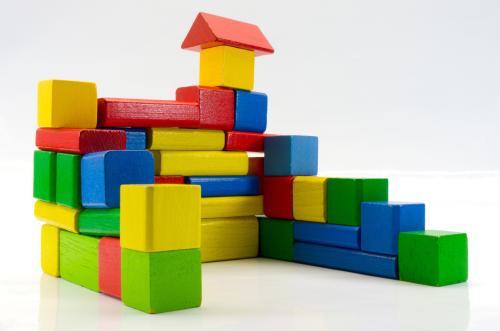
Other toys can also be used, however. In one scenario involving hand puppets, the therapist lets the girl being treated choose between a turtle and a crocodile. The girl chooses the crocodile – and while playing, decides to eat the turtle. The choice of the more powerful position could be an indication of an anxiety disorder or depression, as well as low self-esteem. In other words, everything that the turtle stands for – but it is still much too close to the child’s own identity in the beginning. Over the course of a few play sessions, the girl eventually chooses the turtle, namely when she feels strong enough, and beats the crocodile in a fight, forcing it to flee. This role change is a sign that the therapy has worked, and the girl has overcome her fears and can lead a self-determined life from then on.
Epilogue
Some people wonder where they’d end up if they just did what they wanted to do. As we have seen, the answer is quite far. That’s why it’s high time to bring some play into our lives. When you get so into playing that you forget everything else around you, you’re happy and you don’t have any other desires. And if you don’t have desires, you don’t become a consumer. Fortunately, new generations are in the process of shedding the old behavioral patterns and thought patterns. They enjoy discovering new things, actively shaping their lives, and playfully trying things out to see what’s possible. Let’s encourage them in the process – let the children play!
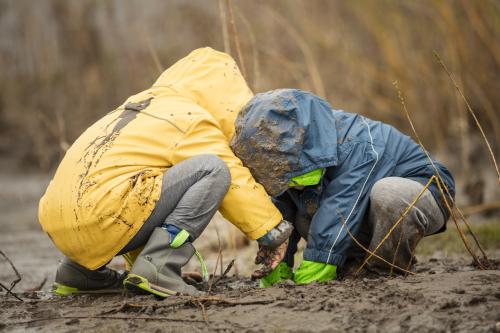
QUADRO is Play
Why do we bother looking at such interesting and complex topics as play? Because it helps us understand children better – these insights then flow into the development of new products and play ideas naturally and essentially in passing. After all, that’s what QUADRO is all about – being creative in an uninhibited and self-confident way, making innovations possible, and simply building great toys for children.
QUADRO is playing in its purest, most original form. A QUADRO set invites children to lose themselves while playing, climbing, sliding, and splashing around. And do so for hours on end. It serves as a stage for role play – whether your child wants to be an astronaut or a knight. With QUADRO, anything is possible.
The awesome thing is that your child can even come up with something that we QUADRO designers ourselves haven’t even thought of yet. We think that’s great – because we also like to learn playfully as we go.
Find out how people play in Poland in the blog article Every Day Another Dream. In our story In Saint Petersburg, People Prefer the Unusual and Extravagant we take a look at how children from Russia play.
Sources:
- Gerald Hüther, Christoph Quarch. Rettet das Spiel! Weil Leben mehr als Funktionieren ist. btb, 4. Aufl., 2018
- Gerald Hüther: Spielerisch Lernen im 21. Jahrhundert
- Dr. André Frank Zimpel: „Spielen ist immer die effizienteste Form des Lernens“
- Dr. André Frank Zimpel: Spielen macht schlau
- Andre Frank Zimpel: Warum das Spielen nicht nur für Kinder wichtig ist
- Christoph Quarch: Spiel. Die Quelle der Lebendigkeit
- (Lange Fassung) Interview Arno (und André) Stern: wie man Kinderbilder nicht betrachten soll
- Arno Stern über das Malspiel, Kunsterziehung und die Gefahren für die Spielfähigkeit unserer Kinder
- Kinder lernen soziale Kompetenzen spielerisch | LexiTV | MDR
- Kinderspiel: Wie Entwicklung und Spiel zusammenhängen | Quarks
- Online Lexikon für Psychologie und Pädagogik
Spieltherapie - Spieltherapie in der Vitos Kinder- und Jugendklinik für psychische Gesundheit Marburg
- Setting up play dates for kids can be traumatic
- Der Videobeweis ist eine echte Gefahr für den Fußball
- Do You Love Me? Boston Dynamics
- Aussterbende Berufe. weiterbildung-onlinemarketing.com

Komentáre